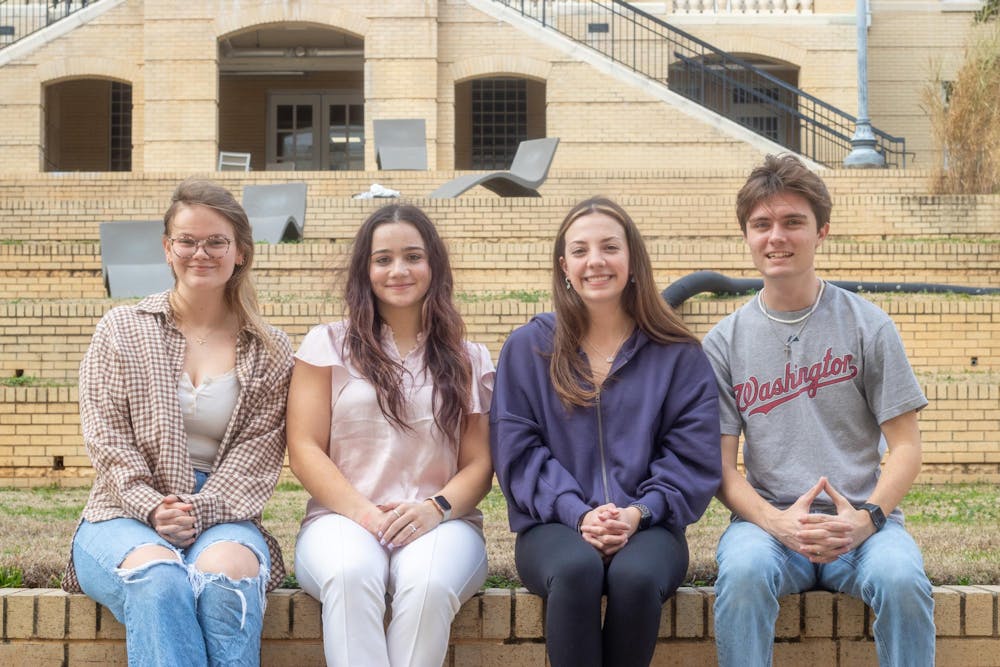Equalitree, a discussion-based podcast hosted by four members of Sustainable Carolina, aims to promote awareness of environmental justice issues among USC students.
Equalitree is run by the Environmental Justice team of Sustainable Carolina, an environmental student organization. Equalitree’s Instagram defines environmental justice as “ensuring that no group of people bears a disproportionate share of the negative environmental consequences resulting from industrial, governmental, or commercial operations or policies.”
The Environmental Justice team created Equalitree in Fall 2023 to raise awareness of environmental issues. Within Sustainable Carolina, the Environmental Justice team advocates for groups often impacted more severely by harmful environmental policies. The podcast has covered topics from extreme weather to water quality.
Third-year international business, accounting and risk management and insurance student Bridget Salmon founded Equalitree with two other members of Sustainable Carolina. The important issues Equalitree discusses motivated Salmon to continue producing the podcast, she said.
“We went through a lot of technical challenges at first with figuring out how to set it up," Salmon said. "But we decided it was super worthwhile and the right decision, because being able to communicate these issues to people who don’t necessarily know what they are was very important to us.”
Second-year environmental science student and co-host of Equalitree Kayla Thompson said an episode discussing water quality crises was her favorite because it discussed an issue often overlooked by students.
“They’re not typically talked about in classes unless you’re taking a class that covers something like environmental justice," Thompson said. "Spreading awareness about these crises that are going on that are disproportionately affecting minorities, people of color (and) lower-income groups, it’s important to shed light on the issues that they are facing.”
Thompson said that a podcast is a great medium to reach people about difficult issues and gives people a flexible outlet to learn from.
“I think that (doing) a podcast for issues that can be very heavy for some people to learn about," Thompson said. "It makes the information that we’re talking about more digestible. And I think it can reach audiences that aren't necessarily environmental justice or environmental science oriented."
Second-year environmental science student and co-host Mia LaPinta said the podcast's goal is to inform students who aren't as aware of environmental justice issues.
“The whole point of (environmental justice) is educating and giving people something where they can listen on their own terms … the way podcasts operate is a really, really good way to communicate (environmental justice) topics to people,” LaPinta said.
The production of each episode requires the hosts to brainstorm and choose a relevant topic, conduct research and structure and record the episode. Third-year environmental science and political science student and co-host Jackson Hensley conducted specific research for his first episode.
"We were talking about each presidential candidate’s environmental justice policy, and that was one that took a bit longer because it’s specific and hard to find and follow through on the policy outcomes and impacts of each of those policies, or lack thereof,” Hensley said.
All of the hosts joined Equalitree with little to no podcasting experience, instead learning through doing, the hosts said. Over time, the way the podcast is recorded has changed as the hosts learned what worked best for them. Hensley said it was disconcerting to talk to invisible future viewers.
“Thus far, I’ve only been a guest on one episode … but in that experience it was definitely weird to be talking into the void, it felt like, and also then understanding while you’re having a conversation with a peer, you’re also having a conversation with however many listeners you have … and that’s odd,” Hensley said.
The Equalitree hosts choose topics they believe to be relevant to their audience, but Salmon said her favorite episodes are those that emphasize human rights.
“Issues that involve people are the ones that mean the most to me,” Salmon said.
Salmon said she has learned about relevant environmental issues through her work on Equalitree.
“I've learned a lot (about) environmental justice issues ... I don't get to learn those things in my classes, because that's not something that I'm studying academically. For me, learning about these issues and educating myself is really the biggest thing,” Salmon said.

As the podcast has grown in listenership, Salmon said she hopes that students, especially those whose studies aren’t environment-focused, will be inspired to learn through Equalitree.
“It's always important to educate yourself. It never hurts to learn more. And so I think even if environmental science isn't an area that interests you, it's important to stay up to date on news and just learn,” Salmon said.
Thompson said that her pitch of Equalitree to a student not involved or interested in the environment would emphasize how environmental justice intersects with many other areas.
“People or students, specifically, from any discipline, any major, there is some way that sustainability and … policies that determine environmental justice will impact them,” Thompson said. “Many people don't realize that, so maybe telling students that, ‘Hey, this will affect you too, whether you know it or not,’ might encourage them to take a listen to learn.”
The Equalitree hosts plan to produce episodes once per week during the Spring 2025 semester, Salmon said. Equalitree is available for listening on Spotify.

